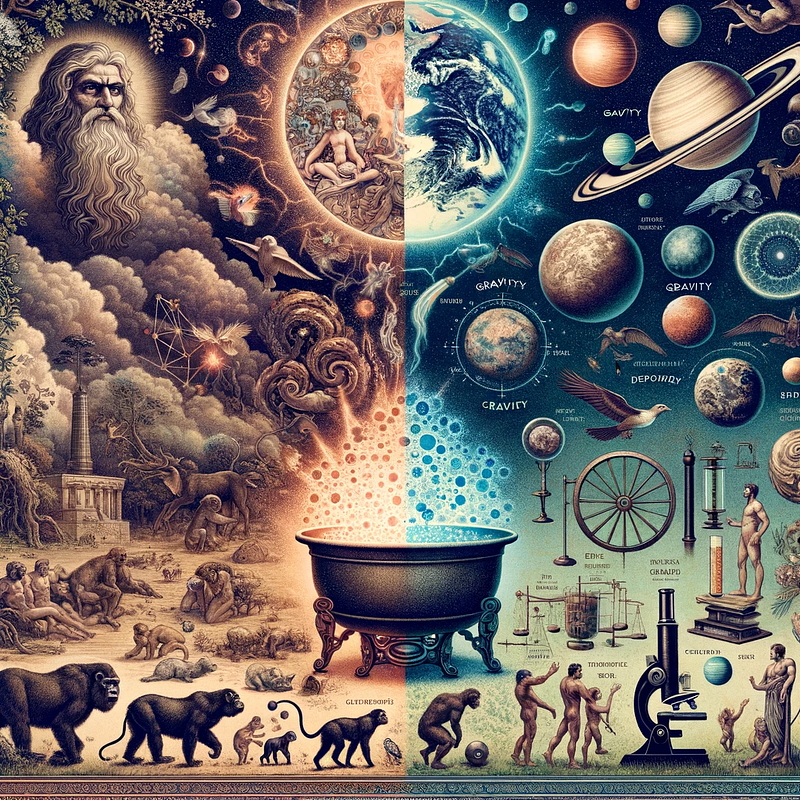The Role of God in Humanity's Search for Knowledge
Written on
Chapter 1: The Dawn of Inquiry
In the early days of humanity, individuals were filled with a multitude of questions. What is the source of the sun, rain, and lightning? Why do rivers flow and why do earthquakes occur? With the vast array of flora and fauna around them, and the celestial bodies overhead, primitive humans lacked the means to seek answers. Tools such as telescopes and microscopes were yet to be developed, and their daily lives were consumed with survival tasks like hunting, gathering, and socializing.
The shift toward understanding the world began with the advent of agriculture and the rise of civilization. Once humans could store food and establish social hierarchies, a portion of the population—primarily the elites—had the luxury of pondering existential questions.
To grasp what life was like before civilization, one might look at documentaries depicting uncontacted tribes or read accounts of Native American societies prior to European colonization. Such resources provide insight into a time when humans were not scientists or practitioners of Christianity, but rather individuals in need of spiritual guidance. It raises the question: why were these communities not endowed with inherent beliefs? Why did they rely on missionaries for faith?
Faced with a multitude of unanswered questions, humanity created a simple three-letter word: GOD. This concept served to assuage their fears and uncertainties, providing a blanket of comfort that resolved their existential angst. Suddenly, the mysteries of the universe seemed manageable, and life’s trials were explained through this singular notion.
Imagine trying to enjoy a gripping television series only to pause halfway through—it’s nearly impossible to relax. Our minds crave resolution, and "GOD" offered the closure that was desperately needed.
Humans are remarkable creators, and the concept of God emerged as a psychological balm for the uncertainties of existence. In previous discussions, I have explored how the notion of God aids in alleviating stress and anxiety in an unpredictable world.
Yet, the implications of God extend beyond mere comfort. This belief system has been utilized to justify wars, oppression, and even the rule of tyrants, allowing the powerful to claim divine endorsement for their actions.
Napoleon Bonaparte remarked on the social order that religion upholds, suggesting that it connects the idea of heaven with equality, ultimately serving to protect the wealthy from uprisings by the impoverished.
For a long time, this simplistic answer sufficed. However, some individuals began to challenge these notions. Observations led to realizations: even if the earth appeared flat, shadows suggested otherwise. Others questioned the anthropocentric view of the universe. One daring thinker even proposed that humans might share ancestry with primates.
Through these inquiries, ignorance began to dissipate, gradually replaced by knowledge. Today, we find ourselves illuminated by understanding, though shadows still exist—areas where believers assert that these gaps in knowledge indicate the presence of God.
The reasoning that “if something is unknown, it must be God” is prevalent among believers. Often, they argue that science cannot fully explain certain phenomena, thereby implying a divine hand at play. This reliance on gaps in knowledge, termed the “God of the gaps,” highlights a significant flaw in religious reasoning.
In contrast, when we encounter something unknown, we acknowledge that it is simply a matter of "not knowing yet." Yet for believers, this translates to "it must be God." This perspective is fundamentally unsubstantiated, reducing a lifetime of belief to a reliance on incomplete scientific understanding.
As knowledge expands, the concept of God continues to recede into the background. A recent study published in Nature Human Behaviour illustrates this trend, documenting the inclination to resort to supernatural explanations in 114 nonindustrial societies.
The primary conclusion of this study is that when faced with natural phenomena lacking clear human origins, people often turn to supernatural explanations. This suggests that early religious beliefs were rooted in humanity's attempts to make sense of the natural world.
If this exploration intrigued you, you may also appreciate:
The Dethronement of God
How humanity emerged from the shadows of ignorance.
Section 1.1: The Historical Context
The interplay between early human existence and the emergence of religious thought is crucial to understanding our current worldview.
Subsection 1.1.1: The Image of Early Humanity

Section 1.2: The Invention of God
The concept of God arose as a psychological tool to fill the void left by unanswered questions, transforming the way humanity interacts with the universe.
Chapter 2: The Scientific Revolution
This first video delves into the idea of the "God of the Gaps" and how figures like Neil deGrasse Tyson address the intersection of science and spirituality.
The second video critiques the gaps in reasoning presented by believers and highlights the flaws in relying on divine explanations for the unexplained.